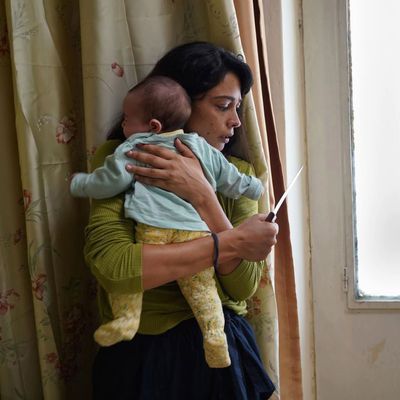
Palestinian director Hany Abu-Assad’s extremely gripping Huda’s Salon begins with a matter-of-fact depiction of a conspiracy so strange and shocking it takes a second to regain your bearings after witnessing it. Even more startling is the possibility that the conspiracy in question may well be based on fact: In the 1980s, reports filtered out that the Israeli secret service was using Palestinian women’s hair salons to recruit spies. The female customers would be drugged, stripped naked, and photographed in compromising positions with the pictures then used to blackmail them or their families into espionage. Astonishing, to be sure, and exactly the kind of narrative idea with which one can imagine Abu-Assad becoming fascinated. The director regularly explores the surreal social dynamic of occupation (as he did in the Oscar-nominated movies Paradise Now and Omar), and his films often take place in a world in which the monstrous and the mundane coexist in dramatic ways.
And so the lengthy, impressively timed and acted opening shot of Huda’s Salon starts with Huda (Manal Awad) starting to do her regular client Reem’s (Maisa Abd Elhadi) hair, and it ends with Reem passed out naked in a back room with a man draped over her as Huda photographs them, the situation having gone from the everyday to the evil with stunning ease. Huda’s blackmail scheme works for one simple reason: These women live in a world where just the hint of adultery — even if unproven, or for that matter disproven — is a life-shattering one. That the photos are a setup is almost academic; Reem’s jealous nitwit of a husband, Yousef (Jalal Masarwa), was already convinced she’d been having an affair. “How did you choose the girls?” Huda is asked at one point. “I chose girls whose husbands were assholes,” she calmly replies. Evidence suggests she had a lot of options to choose from.
The film intercuts between two narrative strands. Huda, caught by the Palestinian resistance, is interrogated in a dark basement by Hasan (the great Ali Suliman), who has discovered her stash of compromising Polaroids and wants to know about the women in the photos. Even though he knows the horrific ways in which they were coerced, Hasan has little compassion for the women. He sees his job as ferreting out the spies in their midst; he likens the process to chemotherapy, which kills healthy cells alongside cancer cells. Meanwhile, Reem desperately searches for a way to clear her name. Her friends reject her. Her husband won’t believe her. The resistance wants to capture her. And because she hasn’t done any actual spying yet, the Israeli secret service won’t help her. It’s enough to make you scream.
Huda’s Salon is that scream in some ways. Abu-Assad has made his share of films about the cruel absurdity of life under Israeli occupation, but here he lets all sides have it. These women are oppressed by everybody. Waiting in a doctor’s office, Reem overhears some women talking about how a friend of theirs won’t tell her husband she has breast cancer because he might divorce her. Huda herself isn’t allowed to see her grown children because of her own divorce, years ago, after an accusation of adultery. Even though the story unfolds in linear time, as we watch these two female protagonists’ journeys, we begin to realize Reem is going through a version of what Huda herself did once upon a time. (The two actresses look not dissimilar, either, and Abu-Assad makes sure to include some moments — gestures, glances, lines — that create echoes between the two story lines.) That’s the subtle aesthetic idea at the picture’s heart. It’s a flashback, but not really.
Huda’s Salon represents an interesting stylistic turn for this director. In his previous movies, he expertly used the exterior spaces of occupied Palestine; Paradise Now, Omar, and The Idol are filled with scenes set along the alleyways and barriers of cities where every piece of land seems contested, where hopping a wall to go see your girlfriend becomes a political act, and where the simple contrast between a crowded street and a sunny boulevard can speak to a character’s overwhelming anguish. This time, Abu-Assad builds the bulk of his film around long takes in enclosed spaces, carefully observing his characters as the nature of their interactions shifts, almost like a theater piece. (During one particularly remarkable dinner party with several couples, we watch the men making jokes about women; the mood then sours as the women start landing digs at the men.) With Abu-Assad’s camera turned inward, the drama plays out almost exclusively on the actors’ faces. And the intimate, slow-burning frustration of Huda and Reem’s predicaments builds and builds until we ourselves start to feel like we’re stuck in a dark prison of the soul. Despite the stylistic restraint, the rage remains.
More From This Series
- Zack Snyder’s Screensaver Space Opera Comes to an Uneventful End
- What If We Didn’t Know Abigail Was a Vampire Movie?
- David Dastmalchian Deserves to Be a Star





